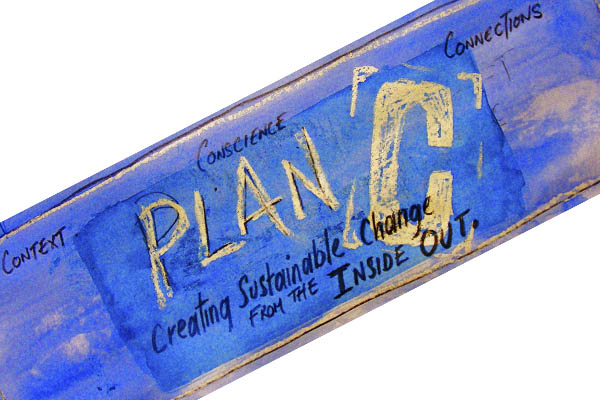If You See a Climate Scientist on the Road, Kill Him

It’s a story of arrogance and ignorance, selfishness and greed, laziness and lack of foresight, and when we read about it we are outraged, we demand resignations that (usually) never materialise and life and the media lurches on in search of the next outrage.
Now Climategate has morphed into Glaciergate with the revelation that the last IPCC report included bogus information about the rate at which the Himalayan glaciers were melting. For me the most outrageous aspect of the ongoing story is the naivety of those who believe that all scientists are rational, infallible, incorruptible and above using clever ‘tricks’ to make their point.
Climate sceptics and holier-than-thou environmentalists have joined together to rail against the use of ‘grey literature’ as if this was an ‘offence’ on a par with genocide and paedophilia. Everyone seems to have forgotten that many significant discoveries begin life in the ‘grey’, as intuition, anecdote and hypothesis. Endless pages are being devoted to the call for more and better peer review, the resignation of Dr Rajendra Pachauri and new leadership of the IPCC.
I have my doubts, particularly when it comes to peer review. So many atrocities which have blighted our world and our lives – nuclear radiation, dioxins and PCBs, GM, thalidomide, the green revolution, to name but a few – have been ‘proved’ to be effective, progressive and safe through peer review. Conversely, some momentous scientific discoveries – for instance those by Albert Einstein and Watson and Crick – were never peer reviewed. Most recently a group of 14 stem-cell researchers published an open letter charging that the process delayed or denied the publication of truly innovative scientific discourse.
In truth, for more than 200 years, peer review has been an old boys’ network where some reviewers are more equal than others and which broadly functions as a way of keeping dissent and views that challenge the status quo out of the public arena. On such foundations is the belief that science will save us built.
The overaching narrative reveals a battle not about who is right but about who is less wrong. And the struggle of the average man is not so much about who you can believe these days, but whose lies or errors of judgement you feel most comfortable living with. It’s a precarious place to be.
What becomes clear is that our view of science suffers from the same distortions and hero worship as our view of sportsmen and celebrities. The Tigers, Terrys but also the Pachauris, groups like the United Nations and professions like bankers and scientists are so often blank canvases onto which we dump all our hopes and aspirations, our desires to be ‘right’ and ‘best’, all our unused potential, but also our darkest, most unconscious stuff, and our deep frustration with life. And perhaps what frustrates and angers us most is that these figureheads are failing to be the type of people we are not willing to be ourselves.
It’s not peer review but personal review that is most needed.
One place to start would be with the Zen koan about killing the Buddha on the road – as apt for climate gurus and environmental heroes as it is for other types of figureheads. Wherever we are on our journey, when we look for enlightenment ‘out there’, often in the form of some person or group who is going to think and act on our behalf, you can bet it will end in disappointment. The most effective thing we can do is ‘kill’ the misconception that these ‘others’ are our salvation.
Yes, the media preoccupation with tearing down figureheads and ‘idols’ is tedious. But looked at in another light it could also be an instinctive response to this deeper truth. The problem is, because so much of what drives this effort to reveal what lies beneath is unexamined and is happening on an unconscious level, it comes out looking more like a brutal fox hunt than a sincere search for truth.
I’m not saying that we need to deny ourselves heroes – heaven knows so much of environmentalism is already framed in the language of denial. But would it kill us to raise our awareness of how much these figureheads carry that really belongs to us, and reclaim it for ourselves?
Like Corporal Jake Sully, the hero in Avatar, it may be time to ask ourselves: ‘How far out there am I willing to put myself to live in a better world?’ – and then come up with an answer that doesn’t involve the miracle of CGI.
What if, for instance, voters decided to boycott the next election unless politicians could demonstrate a greater sense of environmental awareness? What if we actively encouraged alternative economic systems like LETs schemes and local currencies or took our money en masse out of big banks and put it instead into small community or cooperative banks (harder in the UK than in the US but still doable on some level)? What if for one month we all didn’t use supermarkets, or for two months we all didn’t buy petrol?
We could constructively tear down a system that is killing us by degrees. But we better make sure we have something in place to support us if we do. Therein lies the problem. We have become very skilled at tearing things apart, but frighteningly deskilled at being builders and co-creators.
The first step away from endless exhausting outrage and towards practical and creative ways of building a better future is to claim back all the stuff that we have projected onto these ‘others’ and stop waiting for them to make the world right for us. Instead we need to make it right in our own lives and encourage our families, friends and neighbours to do the same. We are, as the poem goes, powerful beyond measure. Isn’t it time to stop being afraid of our own light?
Originally posted at Plan C.
© Pat Thomas 2010. No reproduction without the author’s permission.












